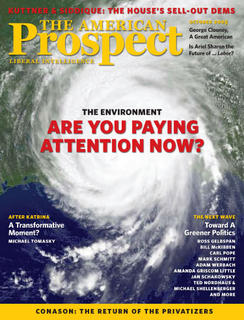 [[S T R A T E G I E S]] * “Is Hurricane Katrina a transformative political moment? Is this finally the time when Americans appraise the failure of the Bush administration--that is, the failure of modern conservatism--and say, ‘Enough’?” asks Michael Tomasky, executive editor of The American Prospect, in a timely and powerful October editorial. “Can liberals seize the opportunity those failures represent to make a case for a different society, in which repeated warnings about the dangers facing a great city aren’t mocked with budget cuts, in which citizens don’t go days without water and food--a society in which mutual and shared obligations are taken seriously?”
[[S T R A T E G I E S]] * “Is Hurricane Katrina a transformative political moment? Is this finally the time when Americans appraise the failure of the Bush administration--that is, the failure of modern conservatism--and say, ‘Enough’?” asks Michael Tomasky, executive editor of The American Prospect, in a timely and powerful October editorial. “Can liberals seize the opportunity those failures represent to make a case for a different society, in which repeated warnings about the dangers facing a great city aren’t mocked with budget cuts, in which citizens don’t go days without water and food--a society in which mutual and shared obligations are taken seriously?”Tomasky’s answer? An unqualified maybe. It will require, he writes, that Democrats and other progressives “make the big-picture case based on core principles, and show how the very tenets of modern conservatism made Katrina’s consequences far worse than they might have been.” He identifies three “central precepts of modern movement conservatism” that contributed to the federal government’s post-Katrina failures:
[F]irst, its sanctification of the individual and concomitant rejection of the community as the foundational unit of social organization (except for religious communities, which are to substitute for political action and social investment); second, its glorification of the corporation--indeed its attempt to model the government on the corporation (although on a very inefficient, corrupted idea of the corporation); and third, its utter anti-empiricism--its ability to deny any fact that is not either presented in a “study” paid for by the oil industry or insisted upon by those greatest of all deniers of fact, the Christian right.Those latter two precepts, he argues, were most obviously in evidence after Katrina smacked the bejesus out of America’s Gulf of Mexico coastline. Conservative ideology that looks upon America “not as a nation but as a corporation,” with MBA-holding Bush as its chief executive officer, leads inevitably to the redefinition of citizens as shareholders, and unequal ones at that. “This worldview--more than fear or lassitude or anything having to do with his personality--is what explains Bush’s slow personal response,” Tomasky opines: “When a corporation faces a crisis, the CEO must protect the price first; he must demonstrate to the shareholders that everything is under control. This is why Bush stayed on vacation, even leaving the Crawford ranch (long after it was clear that Katrina would have enormous consequences) to go to Arizona to speak on Medicare and to California to try, one more listless and dishonest time, to defend the war. His instinct was to act as if everything was fine, everything was normal.”
Yet, everything was far from normal, contends Tomasky, thanks in large part to Bush’s “fantasy-based conservative government.”
The warnings about the insufficient levees protecting New Orleans were many, and were issued on multiple occasions over the years. But the administration ignored the warnings, cutting funding by 44 percent since 2001, forcing the New Orleans branch of the U.S. Army Corps of Engineers to impose a hiring freeze. Those excised funds, or many of them, were--speaking of contempt for empirical evidence--diverted to Iraq. Then, as we learned in the aftermath of the hurricane’s devastation, FEMA, the White House, and other federal agencies knew by at least the Friday before the storm hit land (on a Monday) that the need to get systems into place to help people who would end up stuck in New Orleans was dire. This evidence, too, was ignored. Evidence is for liberals.With so much being reported in the media about Bush administration failures to anticipate and respond to Hurricane Katrina, the editor says, “[t]here may never again be a chance quite like this to draw a crystal-clear line from the A of conservative ideology to the B of the administration’s Katrina failures to the C of the broader lessons about American society.” Now is the perfect time, he insists, “to make the kinds of arguments Democrats haven’t made for a generation. Against the three conservative assumptions that worsened the disaster, we liberals must counterpose our beliefs. We cherish individual liberty, but we also believe in a community in which each of us has equal worth. We believe in robust government to do what the corporations refuse to do, or are not constituted to do well. Finally, we believe in reason and evidence, and we believe that it is a core responsibility of government to respond to them.” Democrats in D.C. would be foolish not to capitalize on Bush’s basement-level ratings and the widespread criticism of his administration’s performance, in order to advance their contrary vision of government, Tomasky editorializes. They have to make their arguments “in unison and without being afraid of the bullies across the aisle and the blowhards on radio and television. America may not be Washington, but its fate is shaped by what comes out of Washington. If ever there were a moment that should remind the Democrats why they came to Washington in the first place, this is it.”
READ MORE: “The Big Uneasy,” by Paul Krugman (The New York Times); “Bush Administration Unable to Account for Katrina Expenditures,” by Steve Soto (The Left Coaster); “School for Scandal,” by Stirling Newberry (TruthOut); “Rita Shows New Rules Not Needed,” by William M. Arkin (The Washington Post).







No comments:
Post a Comment